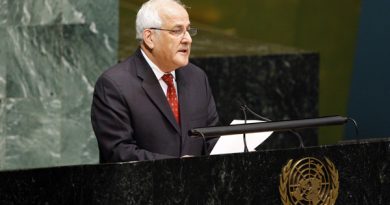Permanent Representative of the Republic of Korea Presents to the School of Diplomacy
Zach Schullian
Staff Writer
On Wednesday, October 20, Cho Hyun, the Permanent Representative of the Republic of Korea to the United Nations, presented to the Seton Hall School of Diplomacy about the Republic of Korea’s and the United States’ alliance, the ROK’s unique relationship with the UN, and the ROK’s position on the world stage. Dean Courtney Smith of the Diplomacy School introduced Ambassador Cho to the audience, accompanied by two undergraduate students who later led the Q&A session following the ambassador’s presentation.
Ambassador Cho opened his presentation with an overview of South Korea’s history. The ambassador explained how before the Japanese annexation of Korea at the turn of the 20th century, Korea under the Joseon dynasty held onto what he called a “rigid” belief system heavily influenced by neo-Confucianist ideology. In 1905, Korea became a protectorate of Japan. The 20th century marked a major turning point in Korea’s history due to the rapid influx of new ideologies, major wars, and regional competition. Ultimately, after Korea’s division into North and South, there remains a zeal to be reunified—mainly due to Korea’s century-long history of being a single entity. The ambassador emphasized that understanding these key events of Korean history is crucial to understanding South Korea’s current position in the world.
Next, the ambassador discussed the relationship between the United States and the Republic and Korea. He pointed to several areas where the U.S. and the Republic of Korea (ROK) have worked side by side. He reflected on the two countries’ cooperation in economic issues, such as the development of a successful market economy and the promotion of capitalist values abroad. Companies such as Samsung strongly reflect the shared values of the U.S. and ROK by encouraging global competition, contributing to global economic cooperation, and technological advancement. Furthermore, Korea’s adoption of Western influences in pop culture has massively boosted its recognition around the world, including in K-pop, movies such as “Parasite”, or most recently, the Netflix show Squid Game. In conflict and diplomacy, Ambassador Cho referred to U.S.-ROK cooperation in the Iraq and Afghanistan wars and their shared management of the constant threat of North Korea.
Ambassador Cho then pointed out the unique relationship the Republic of Korea has with the UN. Former UN Secretary-General Ban-Ki Moon, who served from 2007-2016, played a major role in representing South Korea on the world stage. South Korea also just celebrated its’ 20th anniversary as a member of the UN. The ambassador explained that the reason why it has only been 20 years, and not longer, was due to the former Soviet Union. As a former Security Council member, the USSR used its power to repeatedly block South Korea’s attempts to become a member of the UN. It was only until the Soviet Union’s dissolution and subsequent birth of the Russian Federation that South Korea was able to achieve UN membership in 1991. Ambassador Cho further discussed other issues the UN is currently responding to, such as climate change and meeting the Sustainable Development Goals. He mentioned the upcoming meeting in Glasgow, Scotland, where UN countries will gather to discuss targets and strategies for combating climate change; Ambassador Cho noted South Korea’s ambitious targets of reaching carbon neutrality and reducing overall emissions by 40 percent by 2050.
A Q&A session followed the presentation. In response to a question about South Korea’s success in managing the COVID-19 pandemic, the ambassador remarked that Korea’s ability to respond well was because of its cultural norms which differed from other countries such as the US, including the standard practice that “Koreans wear masks.” Another question reflected on the Korean government’s use of popular culture as a tool of diplomacy. Ambassador Cho explained that the main reason was related to the fear of growing Japanese cultural domination in the 1980s. In response, South Korea created its own national pop culture to share with the world and compete with Japan, making it a defining element of the country’s national culture and identity. One other question asked how open-minded South Korea is to embrace movements more prevalent in the West, such as feminism and acceptance of LGBTQ+ rights. The ambassador expressed his optimism, recognizing how shifts in traditional norms have improved the country culturally and economically, personally noting how more women have become diplomats since he began his career.


